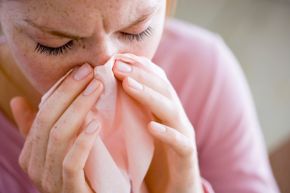A dog may be a man's best friend, but not if the man is among the estimated 10 to 15 percent of the population that suffers from pet allergies. The allergen is a specific protein produced not in the animal's fur, but primarily in its skin and - a lesser extent- urine and saliva.
As the animal is petted or brushed, or as it rubs up against furniture or people, microscopic flakes of skin (called dander) become airborne. Since all cats and dogs have skin, there are no nonallergenic breeds.
However, since short-haired pets have less hair to shed, they send less dander into the air, so are preferable for those with pet allergies. Dogs are half as likely to cause allergic reactions as cats, but if you're allergic to furry animals, the only no-risk pets are fish and reptiles.










